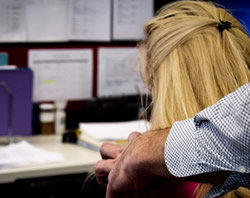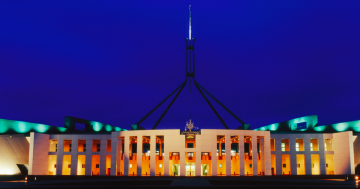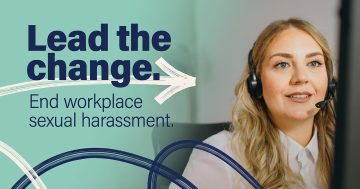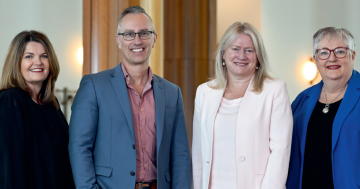According to David Taylor* authorities have said Coronavirus, working from home and recent high-profile cases are encouraging more women to come forward and revealing the true extent of Australia’s sexual harassment problem.
 Law firms say they are being swamped with workplace sexual harassment claims.
Law firms say they are being swamped with workplace sexual harassment claims.
Indeed, so many complaints are being made it has grabbed the attention of the sex discrimination commissioner, Kate Jenkins.
“Certainly, since June, legal workplaces have reported to me that internally they’re getting more reports — more people coming forward saying they’ve been sexually harassed,” Ms Jenkins told the ABC’s PM program.
Mason Ledger employment lawyer Beth Robinson is one of the many legal professionals handling cases right now.
“Sexual harassment training has been around a good 10 to 15 years now, surely everyone’s learned their lesson, but clearly that’s not the case,” she said.
She added that numerous complaints and a conviction against Hollywood producer Harvey Weinstein, the #MeToo movement, and a recent High Court inquiry finding former justice Dyson Heydon sexually harassed associates, have all helped women come forward.
Lawyers are also hopeful the recent sexual harassment claims emerging from AMP will also help more women to speak up.
“The result of that is that we’ve seen people with historical experiences much more willing to step up and say this happened to me, I want to bring that to your attention, and give the option for action to be taken,” Ms Robinson said.
“So across the board I think we’ve seen a greater willingness from people, in particular women, to stand up and say, ‘Sexual harassment is a problem, I’m calling it out, I’m willing to make a complaint.’”
“I think that’s brought on the flood of historic complaints being brought now.”
Home office more conducive to complaints
But working from home, and the distance from the office it creates, is also emboldening more women to come forward.
“The reason for that is one of the barriers of people bringing a sexual harassment claim is the fear associated with having to continue to be in the same workplace with the alleged perpetrator,” Ms Robinson explained.
“So if you put it in the space of COVID, where people are working remotely, out of that direct space, they don’t feel physically threatened or intimidated.”
“They’ve got a lower fear of backlash.”
“You can see why more people would be willing to stand up and bring in a claim and complain to their employer without that intimidation being there.”
Victoria has seen one of the biggest increases in sexual harassment complaints, with cases up six per cent over the past year.
Victoria’s equal opportunity and human rights commissioner, Kristen Hilton, described the increase as “significant”.
“We have seen an increase in sexual harassment complaints this year, and particularly during the period over the past four or five months,” she observed.
“Complaints are up by about 8 per cent, and inquiries are also up from this time last year.
“It is very possible that because people are not in the workplace, and are not worried about coming face to face with their harasser, that they feel more comfortable reporting.”
Data provided to PM by the Human Rights Commission shows that of the 39 sexual harassment complaints between the March 1 and July 31, 2020, 37 were a female complainant with a male respondent, one was a male complainant with a male respondent, and one was a male complainant with a female respondent.
While 39 complaints may not sound like a lot, Kristen Hilton said the vast majority of women who say they experienced workplace sexual harassment do not make formal complaints.
Harassment in a barrage of messages
So, what exactly is happening to victims of sexual harassment in workplaces across the country?
Employment and workplace relations lawyer Beth Robinson has a list.
“So it’s not uncommon for us, when a complaint is made, to be provided with a Messenger document showing someone’s been sent messages 200 or 300 times a day and consistently all across the night, just message after message,” she noted.
“So you see a lot of pressure building up and constant harassment.
“Certainly inappropriate images are sent quite frequently across that platform.
“But you also see in a more public social media space, on people’s Facebook pages comments coming up, private messages being reposted, or private photos being reposted, in order to shame or intimidate a person, or action taken as a result of a rebuffed advance.”
Earlier this year, Ms Jenkins launched Respect@Work, the Australian Human Rights Commission’s report of the National Inquiry into Sexual Harassment in Australian Workplaces 2020.
The 18-month national inquiry examined the nature and prevalence of sexual harassment in Australian workplaces.
It found one-in-three Australians — two-in-five women and just over one-in-four men — have experienced sexual harassment in the workplace in the past five years.
Ms Jenkins told PM a rise in complaints during the coronavirus pandemic had exposed how serious the problem had become nationwide.
“We know from our research that actually sexual harassment for many people is a daily experience at work and a very common experience,” she explained.
“In recent times we have begun to understand just the true prevalence beyond just the few complaints that are usually at the most serious end of sexual harassment.
“We need to start pulling apart the everyday sexual harassment as well as the most serious sexual assault kind of sexual harassment.”
‘Community attitudes are changing’
The CEO of Our Watch, a national body working to prevent violence against women, said all violence against women, which includes workplace sexual harassment, was “rife”.
“Workplace sexual harassment is part of the gendered violence that is rife in our community at the moment,” Patty Kinnersly said.
But while these reports suggest Australia has a serious problem with workplace sexual harassment, Ms Kinnersly said there was reason to hope for improvement.
“Men have got through life being perpetrators or using violence or disrespectful language, and never being held to account,” she said.
“So I think it can be really brazen because they think that other people won’t hold them to account, but I do think community attitudes are changing.”
She added that women in insecure work were the most vulnerable to brazen harassment.
As for what to do if you find yourself receiving unwanted advances?
“I think what’s important is to not get tied up with who’s the perfect person but to reach out to someone,” Ms Kinnersly said.
“If it’s your own manager, or if it’s your own EAP [employee assistance program] provider, or 1800 RESPECT, or triple-0 if you feel like you’re in immediate danger, then you’ve made the start and someone will point you in the right direction for your particular situation.”
*David Taylor is a business reporter for the ABC’s Audio Current Affairs programs. He can be contacted on Twitter @DaveTaylorNews.
This article first appeared at abc.net.au











